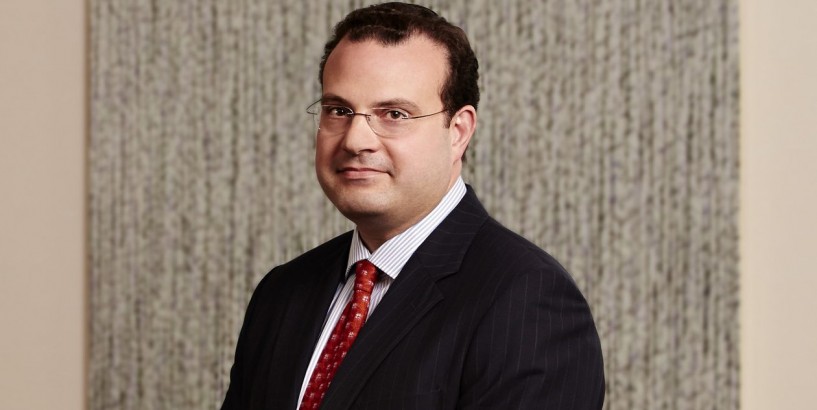WASHINGTON – President Trump on Monday renominated Buffalo attorney John L. Sinatra Jr. to a long-vacant federal judgeship in Buffalo, moving one more step forward in the seemingly endless process of filling a slot that opened up when U.S. District Court Judge William M. Skretny announced his move to senior status nearly five years ago.
Trump first nominated Sinatra, 47, for the slot last May, but the Senate never acted on his nomination or those of 69 other federal judicial appointments last year.
This time around, though, things should be different, said Allison Biasotti, a spokeswoman for Senate Minority Leader Charles E. Schumer, a New York Democrat who agreed to Sinatra's nomination.
“We expect Mr. Sinatra’s nomination to move forward quickly and do not anticipate it will be controversial,” Biasotti said.
The Senate's failure to confirm Sinatra and the other judicial nominees last year meant the president had to renominate them all, and Trump did just that with 51 of them in January.
But Trump did not renominate Sinatra at the time, thereby putting him behind all those other appointees in the confirmation process.
Trump never explained why he did not renominate Sinatra when it announced those other appointments in January, nor did the White House explain the delay in announcing Sinatra's renomination Monday.
Allies of Rep. Chris Collins, the Clarence Republican who pushed for Sinatra's appointment, had urged patience regarding Sinatra's renomination.
Collins' office did not respond to a request for comment Monday. When Trump first nominated Sinatra last May, Collins said: "John Sinatra is an impressive, intelligent and fair individual who is held in the highest regard by his legal peers as well as our community. I have no doubt that he will serve the court with dignity and honor based on his principled understanding of the law."
Sinatra is a partner in the business litigation group at Hodgson Russ LLP in Buffalo.
Local lawyers from both sides of the political spectrum praised Sinatra's appointment last year. But at a hearing last summer, Democrats questioned Sinatra over the fact that his brother, Buffalo developer Nick Sinatra , is Collins' partner on several real estate ventures.
[Related: John L. Sinatra's federal judge nomination hits another speed bump ]
Nevertheless, the Senate Judiciary Committee approved Sinatra 's nomination by a 16-5 vote Aug. 1.
A week later, federal prosecutors in New York charged Collins with fraud and conspiracy in connection with an alleged insider trading scheme. Collins has denied those charges and vowed to fight them in court, and Sinatra's renomination seemed to be a sign that Collins' legal troubles had no bearing on how the long vacant federal judgeship in Buffalo would be filled.
It's customary that a state's senior senator gets to recommend judicial nominees, but that doesn't happen when the president is of the opposite party of a state's U.S. senators.
That's the case in New York, given that Schumer's a Democrat and Trump a Republican.
In such situations, a hometown member of the House from the president's party – such as Collins – holds more sway in such nominations. In that case, the senior senator simply must consent to the nomination of a federal judge, and that's just what Schumer did regarding Sinatra last May.
Skretny announced his plans to move to senior status in 2014, prompting Schumer, in June of that year, to recommend that President Obama nominate former U.S. attorney Denise O'Donnell for Skretny's seat. But Obama never did so, prompting O'Donnell to withdraw her nomination in October 2015.
Schumer then recommended, and Obama nominated, Buffalo attorney Kathleen M. Sweet for the judgeship. But the Senate adjourned at the end of 2016 without acting on her nomination.
That meant the new president – Trump – got to nominate someone else for the slot.
Sinatra's nomination died at the end of 2018, though, when the Senate adjourned without confirming him or those other Trump judicial nominees before the end of the 115th Congress. That happened because Schumer and Senate Majority Leader Mitch McConnell, a Kentucky Republican, could not agree on a way to consider them before the end of the 115th Congress.
Sinatra's path to confirmation should be easier now. That's because the Senate's Republican majority recently voted to change its rules to speed up the confirmation process by limiting debate and the delaying tactics the opposition Democrats were using.
Sinatra's confirmation couldn't come soon enough for Buffalo's overtaxed federal courts. For the year ending March 31, 2018, the median amount of time that it took to resolve civil cases in the Western District of New York was 11.7 months. That was the longest such interval in the state.
Meanwhile, New York's Western District faced a growing backlog of criminal cases. Some 392 criminal cases were filed in the district, which includes Buffalo and Rochester, in the year ending March 31, 2018. That's a 24.4 percent increase from the previous year.









